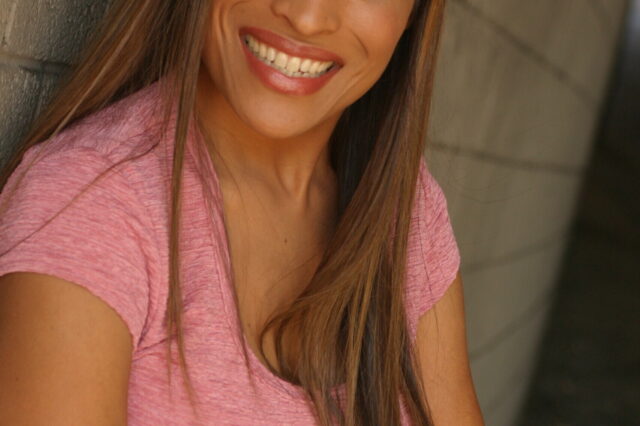Parkinson’s advocate Rasheda Ali says care needs to be more patient-focused

Rasheda Ali, an author and advocate in the fight against Parkinson’s disease. (Photo courtsey of Rasheda Ali)
More comprehensive, patient-focused care would vastly improve the lives of Parkinson’s patients, according to Rasheda Ali, an author and advocate in the fight against Parkinson’s disease.
Ali will champion an approach that places patients in the center of a spectrum of care during “The Night of Champions,” an event to benefit the University of Florida Center for Movement Disorders and Neurorestoration, on May 25.
The daughter of one of the most recognized men in the world — boxing great Muhammad Ali, who was diagnosed with Parkinson’s in 1984 — Rasheda Ali says health care services for patients need to advance beyond an antiquated model of disconnected appointments at doctor’s offices, hospitals, therapy sessions and diagnostic facilities.
She endorses the approach being pioneered at the Center for Movement Disorders and Neurorestoration, where caregivers from more than a dozen specialties combine under one roof to meet the physical and emotional needs of patients and families.
“Parkinson’s disease is life-altering, but it isn’t the end of someone’s goals and dreams,” Ali said. “To help people move forward, it is crucial for health care providers to connect with one another and deliver care as a team, concentrating not just on the physical symptoms of someone’s Parkinson’s disease, but the emotional and support needs of the patient and the family.”
One of the guiding principles of the Center for Movement Disorders and Neurorestoration is to focus resources on patients by providing access to 12 UF faculty physicians, Shands rehabilitation specialists, cognitive specialists, physical, occupational and speech therapists, social workers and CT and MRI scanning — all under one roof.
“It’s like the idea of ‘one-stop shopping,’ but it provides more than just convenience,” Ali said. “It is a better, safer way to treat patients, address all of their family issues, and improve the quality of their lives.”
When the UF center took shape in 2002, it emphasized medical and neurosurgical solutions to movement problems. It expanded to include a wide range of physical and neuropsychiatric therapies so that even if a disease progresses, patients can find ways to enjoy their lives. In April, much of this activity was consolidated under one roof at the UF Orthopaedics and Sports Medicine Institute, with former U.S. Attorney Janet Reno receiving the first tour.
“One of the most crucial factors in our success against Parkinson’s disease has been our ability to pool our worldwide resources in clinical care, outreach and research,” said Dr. Michael Okun, a co-director of the center. “At our center, the idea is 10 or more disciplines revolve around the patient, offering the best care and access to cutting-edge research. When the patients tell us their issues and problems, we look at that, and it often provides us with new research directions. It’s helped us become an international destination for people with Parkinson’s disease, dystonia, tremor, movement problems and ataxia.”
In addition to sharing her thoughts on the delivery of Parkinson’s care during Wednesday’s event, Ali will offer insight into how her family has coped with Parkinson’s.
“When my father was given this challenge, he was only 42 years old,” Ali said. “That is young to be handed this condition. It was shocking, but his mentality has always been to never give up. So he went forward, as if his life had just begun. That’s the message. You can move on with your life and fulfill the dreams you’ve always had.”
Six years ago, Ali wrote “I’ll Hold Your Hand So You Won’t Fall: A Child’s Guide to Parkinson’s Disease.” The story that was prompted after her sons Nico and Biaggio saw that their grandfather was shaking and innocently asked, “Why?”
It was a simple question with a complex answer. Parkinson’s is an incurable disease associated with the destruction of brain cells that produce dopamine. Patients — more than a million of them in the U.S. — have problems moving and speaking. Their conditions become gradually worse with time.
It’s hard for adults to understand and accept, let alone children. But they manage.
“Kids are so open to information,” Rasheda Ali said. “They are not judgmental; they take things the way that they are. Neurodegenerative diseases are very complex. That’s why in the book we’ve made it very easy to read, and when I talk to children, we have a lot of fun acting out the symptoms of the disease. They get it.”
Her sons are now 10 and 12 — about the age Rasheda was when she first noticed her father’s voice was getting softer and his hands were shaking slightly.
“My sons are actually seeing the progressive condition, and we are all learning — every day,” Rasheda Ali says. “We are all taking this journey together. That’s what happens to all families with Parkinson’s. We are all in the journey together, the whole family unit. Love and compassion make the journey a lot easier.”
Okun and Dr. Kelly Foote, also a co-director of the Center for Movement Disorders and Neurorestoration, invited Ali to give the keynote address at “The Night of Champions.”
“Rasheda Ali has traveled the world delivering a message of hope, love and understanding,” Foote said. “We are thrilled that she will share her unique and fascinating perspective on the experiences of one of the greatest champions of all time, a champion who continues to redefine himself in his greatest fight ever — the fight against Parkinson’s disease.”